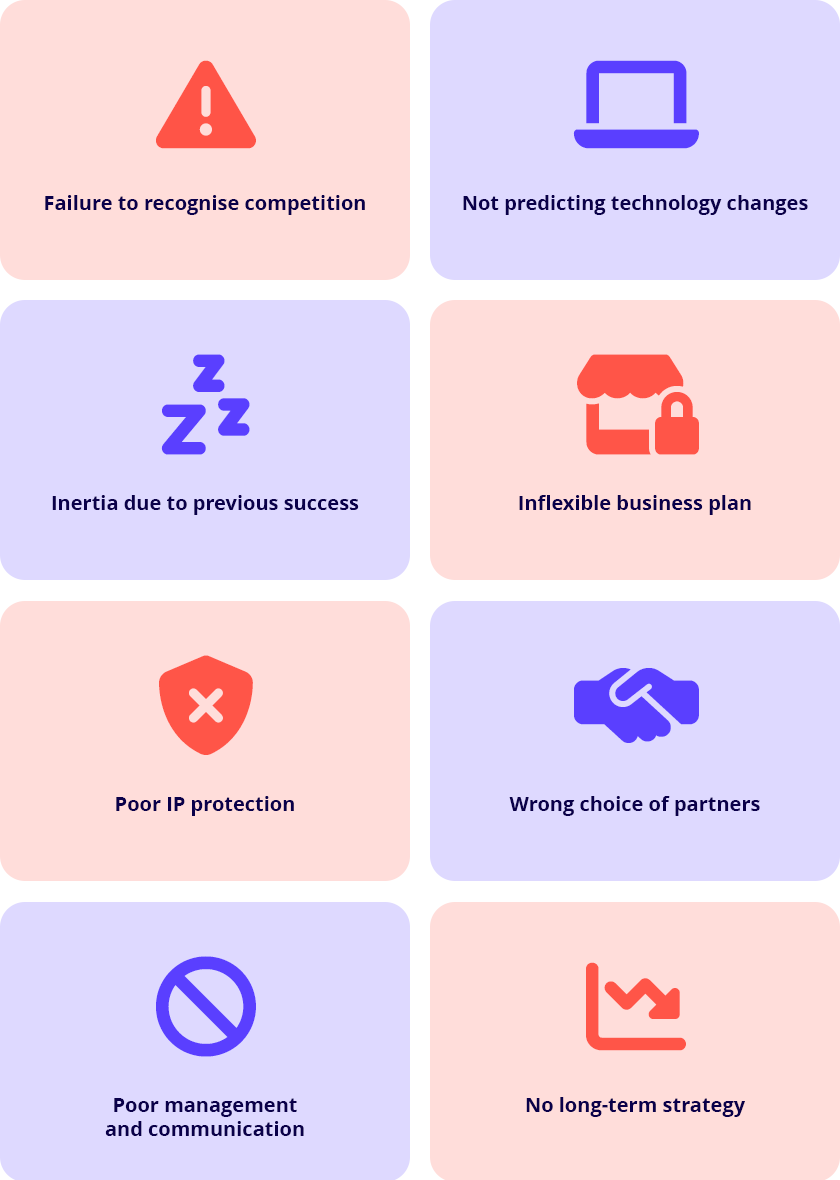For those small business owners looking to avoid the harsh reality of failure, learning from common and famous business mistakes is an excellent remedy to your own possible missteps.
Small business mistakes and ultimate failure is all too common and there’s a plethora of reasons for a business to crumble.
To avoid this and you help become a successful entrepreneur instead, let’s have a peek at some of the most famous and common business mistakes and find what lessons we can learn from their demise.
Whether you run a small business or a start-up – you aren’t too small to learn the big lessons in what not to do.
Schwinn
The business mistakes
- Not preserving your intellectual property (IP) with proper protections
- Poor partnering choices
The story
Schwinn bicycles are a brand I’m sure you’re familiar with. However, Giant (as their brand name may suggest), are a far larger beast. In fact, Giant manufacture the vast majority of the world’s bikes and run their own chain of 12,000 stores.
Schwinn helped them get there.
Huh? Why? How? Because they failed to protect themselves.
Starting out of Chicago in 1985, Schwinn were the originators of some well-designed and popular bicycles. The attraction behind Schwinn was excellent brand recognition and market penetration in the US.
After a workers’ strike in 1980 (on top of expensive and outmoded manufacturing constraints), Schwinn decided to move their manufacturing to Taiwan.
Giant took over manufacturing Schwinn’s bikes at a Taiwanese mega factory shared by other brands. This wouldn’t be so dangerous if they had a solid non-compete agreement in place or other reasonable protections.
But they did not.
Giant simply swiped their designs and started selling clones at two-thirds the price to Schwinn’s own customers. Schwinn subsequently went bankrupt in 1992 and is now a shell of its former self. A classic case of letting the fox guard the henhouse.
The business lesson
If you’re ever in the position of partnering with other businesses to get your goods or services to market, be very particular about the agreements you create and the protection of your intellectual property. What may be an attractive deal at first may well be your undoing.
Borders Books
The business mistakes
- Failure to see and respond to market changes
- Overlooking technology shifts
- Investing in the wrong areas at the wrong time
The story
For over 40 years, Borders Books were the big dogs of the US bookstore market. They innovated a new catalogue system which predicted book sale volumes and they were often the biggest store in the neighbourhood – offering a sprawling range and volume of titles which other stores could only dream of.
They seemed set for monopoly. But then Borders took their eyes off the road.
In the 2000s, Borders were still investing heavily in physical DVDs and CDs while their sales were declining. You can imagine what that did to the bottom line over a few years.
Then, from 2001 until 2008, they let Amazon run their eCommerce business and website. They outsourced something they should have been dominating in-house, giving up market share and brand recognition. Not looking good so far, Borders.
In yet another dubious move, Borders (unlike competitor Barnes & Noble) failed to capture the e-reader market. In a somewhat blind decision, they didn’t seem to understand the future of books or publishing and gave up that pole position to a competitor.
Inevitably, online sales and eBooks took off, while DVDs, physical books and CDs declined. This was the perfect storm that would sink the Borders ship.
“Borders Books went out of business in 2011, and sold all of its trademarks and customer lists to Barnes & Noble,” Business Insider
The business lesson
If you’re in a market which is experiencing technological flux and digital disruption, you need to be sensitive to change.
Not only should you be letting go of products and services that aren’t performing and have no future, but you should also be active in analysing and predicting the coming changes. Failure to adjust, predict and correct course will spell business doom.
Nokia
The business mistakes
- Idleness, fear, and poor communication among management
- Lack of technological innovation
- Failure to invest in research and development (R&D) and remain competitive
- Blindness to emerging competition
The story
Oh Nokia, how we all loved thee.
I bet you remember the first time you played Snake, dropped that indestructible little guy harmlessly down the stairs or marvelled at its two week-long battery. Simpler times.
They were the undisputed handset of choice and enjoyed many a fine year at the top of the food chain. So, what went wrong? Well, the Apple iPhone for one, but that’s not the whole story.
“We didn’t do anything wrong, but somehow, we lost,” former Nokia CEO Stephen Elop.
This comment was made as Nokia were being bought by Microsoft. But is this strictly true?
The argument loses steam when you realise something more radical and innovative needed to be done. In short, there was a lack of vision and too much complacency.
While Nokia was stuck on a device-dependant operating system (Symbian), they failed to realise that other companies like Apple and Samsung were instead working on apps and platforms like Android and iOS which were device agnostic.
When the iPhone landed with a bang in 2007, Nokia were caught off guard by the new era. They had time to adapt (like Samsung did), but management idleness and disorganisation was in the way.
A qualitive study by Tim Vuori (Aalto University) and Quiy Huy (INSEAD Singapore) found that amid the competitive chaos, there was a pervasive culture of fear among the management team of Nokia, which bred paralysis and poor communication.
Eventually, all of these factors combined, and the once great company was sold off.
The business lessons
The big take away here is that even if you do nothing ‘wrong’, you can still fail. You can fail due to inertia and arrogance as you feel a little bulletproof due to previous success.
Instead, you should be an active change seeker, interrogating new competitors while breeding a management culture of innovation and communication. If you fail to move, fail to change or evolve, and fail to plan for new competition, you will fail completely.
New business mistakes
As a fledgling new small business, business plan mistakes are an unfortunately common part of the landscape. Being able to identify and avoid such mistakes (as you’ve seen from the above examples) is vital to the future prosperity and success of your small business or start up.
Many small business owners could take a leaf out this book to ensure such small business mistakes never occur. Look out for the following common small business mistakes:
- Failure to see new small business challengers or competition.
- Inability to predict technology changes.
- Inertia brought about by previous success.
- Inflexible business plan.
- Poor IP protection.
- Wrong choice of partners.
- Poor management and communication.
- No long-term strategy.

























